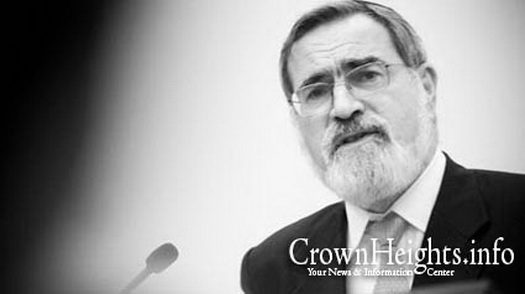
A Tribute To Rabbi Lord Jonathan Sacks, From Shliach Rabbi Mendel Cohen
Arguably the closest Shliach to Rabbi Sacks is Rabbi Mendel Cohen, Rabbi of Saatchi Synagogue in Maida Vale, London. Rabbi Sacks would daven daily in his shul since he left the position of Chief Rabbi of England.
This is what Rabbi Cohen posted:
Tzama Lecha Nafshi – the soul of Rabbi Sacks z”l
Rabbi Sacks: Mendel, is it as big as they say it is?
Me: No. Bigger.
RS: Then I need more time to prepare.
Me: Do you not need to go while you’re still in office?
A few weeks later.
Me: Have you thought about going?
RS: I have spoken to Rabbi Shmuel Lew. I’m ready to go.
I was privileged to have a seat in the Beit Midrash of St. John’s Wood Synagogue next to Rabbi Sacks. It was during one of those occasions that we had the above conversation. We were discussing the Chabad International Kinus Convention.
I first met Rabbi Sacks in the early 90’s as a young boy in Leeds. He visited our Shtibel on Shabbat afternoon. I vividly remember the fast pace with which he walked in and the distinguished and personal smile he gave each of us children as we shook his hand. The very same smile and handshake he gave my children when he and Elaine graced our Shabbat table in St. John’s Wood twenty years later.
Many memories will pour in over the coming days, weeks and months, I want to share a few of the personal moments that I had with Rabbi Sacks. Like the conversation above, some were short and poignant. Others were ongoing, they were never meant to end.
Rabbi Sacks would spend a few months a year writing, during which time he could not be disturbed with other things. He once told me there were few people that he can describe his writing time to. “No one understands me when I say I am in Atzilut” – referring to the highest of the four Kabbalistic spiritual worlds.
I would get countless requests from people across the world for a message, a visit, or an opinion from Rabbi Sacks. I was in no place to have influence on this. But one such call from Rabbi Slavin in Sydney I could not overlook. He wanted a signed book from Rabbi Sacks for George.
George, a Greek-Australian had arrived at Rabbi Slavin’s office one day, recently released from many years behind bars. He wanted to give back to the Jewish community. Why? Because throughout his incarceration this non-Jewish convict had been inspired to change by Rabbi Sacks writings. He read them each week. Now a free, and a changed man, he wanted to give back. He now manages meals for the homeless out of “Our Big Kitchen”.
When I told Rabbi Sacks this story he wrote the inscription, he then asked me to repeat the story again, he then asked me to say it a third time to his wife Elaine. “I don’t always know the direct influence that my writings have, I am happy you shared this with me.”
In one of the last Shabbats that Rabbi Sacks visited communities before lockdown he spoke to the parents of our Hebrew School. It was one of the most moving and intimate talks I ever attended. He spent a long time explaining to the parents the importance of Jewish education. He told parents that much of what a child learns in school is information that barely affects them in the course of life. Not so Cheder and informal Jewish education.
Rabbi Sacks then told us that when he was davening with the Rebbe for Rosh Hashanah after services he was invited to lunch. There was one other guest a non-affiliated songwriter. Just the two of them. Rabbi Sacks asked him how he had arrived at the Rebbe for Rosh Hashanah? He responded that he was driving through his town one day and started hearing a song in his mind, it was a childhood memory, a tune from Hebrew classes. He was awakened, and he did a u-turn and drove all the way for many hours straight to 770 where he arrived in time for Rosh Hashana with the Rebbe.
“You never know,” Rabbi Sacks concluded, to a group of teary-eyed parents, “Which tune will come in to your child’s mind one day. But it will, and it will bring them back.”
Rabbi Sacks loved songs, and especially niggunim. In 1991 he was a guest on Radio 4’s Desert Island Discs – where the castaway chooses eight tracks, a book and a luxury. Rabbi Sacks shared the soundtrack of his life. One of the tunes and his ‘castaway favourite’ was the Chabad niggun Tzama Lecha Nafshi; My soul thirsts for You, my flesh longs for You, In a desolate and weary land with no water. So, too, may I see You in holiness.
Last year on Shabbat Vayeira, the same portion Rabbi Sacks passed away, our community held a Shabbat Dinner with Rabbi Sacks. Chassidic singer Shulem Lemmer was another guest. As he often did, he motioned to me and said: “Nu Mendel, a Niggun”.
I introduced Tzama Lecha Nafshi, explaining the historical context of King David describing his yearning to experience Hashem while in Midbar Yehudah far from the Mishkan. How befitting then it was to be with Rabbi Sacks on a desert island.
I ended with the words of the Ba’al Shem Tov on this verse: “Halevai Bakodesh Chazisicha” – King David wished, that when he returned to the Mishkan, he should have the same yearning as he did while away.
After Shulem sang the song, Rabbi Sacks told a story about one of his heroes, the British philosopher Sir Isaiah Berlin, who was descendant of the Alter Rebbe. When Isaiah was granted a coat-of-arms he asked Rabbi Sacks to design it, using the three prongs of Chabad, which he did. While the design was not used Rabbi Sacks remarked, that Isaiah demonstrated that wherever one’s life takes them, ultimately one’s Chassidic past and one’s soul, even though concealed, never goes away, Ken Bakodesh Chasizicha.
I later asked him, if he felt the same way, perhaps he was inspired to tell this tale to awaken his Chassidic past and its soul?
No, he replied, mine is very much alight.
At Rabbi Sacks’ funeral yesterday, his dear friend Rabbi Lionel Rosenfeld sang this song and quoted the words from Desert Island Discs, when Rabbi Sacks said:
“Tzama Lecha Nafshi – My soul thirsts for you. Quite simply I hope one day something like that will be my epitaph – that his soul thirsted for G-d.”
Ken Bakodesh Chazisicha, – may he see You in holiness, May Hashem bind his soul in the bond of life – תנצבה.
Rabbi Sacks














